Twenty20 International
A Twenty20 International (T20I) is a form of cricket, played between two of the top members of the International Cricket Council (ICC), in which each team faces 20 overs. The matches have top-class status and are the highest T20 standard. The game is played under the rules of Twenty20 cricket.
The shortened format was initially introduced to bolster crowds for the domestic game, and was not intended to be played internationally, but the first Twenty20 International took place on 17 February 2005 when Australia defeated New Zealand, and the first tournament was played two years later, with the introduction of the ICC World Twenty20. There remain limits on how many Twenty20 Internationals a team can play each year, in order to protect Test cricket and One Day Internationals. As of 2016, there are 18 nations that feature in ICC T20I team rankings.[1]
The shorter format of the game makes reaching the traditional milestones of scoring a century or taking five wickets in an innings more difficult, and few players have achieved these. The highest individual score in a Twenty20 International is 156, made by Australia's Aaron Finch against England in 2013, while Sri Lanka's Ajantha Mendis is the only bowler to have taken six wickets in an innings, and fewer than twenty players have taken five wickets in an innings.
Origins
Cricket itself was probably first played in England in the Late Middle Ages, but it did not rise to prominence until the eighteenth century. A set of laws were drawn up in 1744, and the game achieved a level of relative standardisation by the late nineteenth century.[2] One-day cricket was trialled in 1962, and the first domestic tournament played the following year,[3] and in 1971, England and Australia contested the first One Day International. The match consisted of one innings for each side, with 40 eight-ball overs.[4]
In the 1990s, a number of countries were exploring the possibility of a shorter game still: in New Zealand, Martin Crowe developed Cricket Max, in which each team bats for 10 eight-ball overs,[5] while in Australia they considered an eight-a-side contest they dubbed "Super 8s". At the same time, the England and Wales Cricket Board (ECB) conducted consumer research, and proposed the idea of a 20 overs-per-side contest, which would last for about three hours.[6] The first match was played in 2003 between Hampshire and Sussex.[7]
History
The first Twenty20 International match between two men's sides was played on 17 February 2005, involving Australia and New Zealand. Wisden Cricketers' Almanack reported that "neither side took the game especially seriously",[8] and it was noted by ESPNcricinfo that but for a large score for Ricky Ponting, "the concept would have shuddered".[9] Two further matches were played that year; England beat Australia in June, and South Africa were defeated by New Zealand in October.[10] Early the following year, a contest between New Zealand and the West Indies finished as the first tied match, and a tiebreak was played for the first time in men's international cricket: the two sides took part in a bowl-out to determine a winner; New Zealand won 3–0.[11]
The game had initially been developed to boost the interest in domestic cricket, and to aid this the international teams were only allowed to host three T20Is each year. The cricket manager for the ICC, David Richardson, also commented that "Part of the success of Twenty20 cricket is making sure it can coexist with Test cricket and one-dayers."[12] Despite this, the first international tournament was held in 2007 in South Africa; the 2007 ICC World Twenty20.[12] That tournament was won by India, who defeated their close rivals Pakistan in the final. Writing for The Guardian, Dileep Premachandran suggested that the competition's success meant that "the format is here to stay".[13] The next tournament was scheduled for 2009, and it was decided that they would take place biannually (more frequently than the 50 over Cricket World Cup, which occurs once every four years).[14] In the opening match of the 2007 World Twenty20, Chris Gayle scored the first century in a T20I, the achievement being reached in the twentieth match of the format.[15]
The 500th T20I match was contested between Ireland and the United Arab Emirates at the Sheikh Zayed Stadium, Abu Dhabi on 16 February 2016.[16]
Current international rankings
| ICC T20I Championship | |||||
|---|---|---|---|---|---|
| Rank | Team | Matches | Points | Rating | |
| 1 | | 21 | 2683 | 128 | |
| 2 | | 28 | 3441 | 123 | |
| 3 | | 25 | 2986 | 119 | |
| 4 | | 22 | 2547 | 116 | |
| 5 | | 23 | 2644 | 115 | |
| 6 | | 21 | 2391 | 114 | |
| 7 | | 34 | 3852 | 113 | |
| 8 | | 28 | 2632 | 94 | |
| 9 | | 27 | 2192 | 81 | |
| 10 | | 25 | 1828 | 73 | |
| 11 | | 17 | 1073 | 63 | |
| 12 | | 26 | 1614 | 62 | |
| 13 | | 16 | 975 | 61 | |
| 14 | | 17 | 752 | 44 | |
| 15 | | 19 | 832 | 44 | |
| 16 | | 9 | 352 | 39 | |
| 17 | | 17 | 596 | 35 | |
| Insufficient matches | |||||
| | 6 | — | 68 | ||
| Reference: ICC Rankings, 12 December 2016 | |||||
| "Matches" is the number of matches played in the 12-24 months since the May before last, plus half the number in the 24 months before that. | |||||
Teams with T20I status
The ten Test-playing nations (which are also the ten full members of the ICC) have permanent T20I status. The nations are listed below with the date of each nation's T20I debut shown in brackets:
-
 New Zealand (17 February 2005)
New Zealand (17 February 2005) -
 Australia (17 February 2005)
Australia (17 February 2005) -
 England (13 June 2005)
England (13 June 2005) -
 South Africa (21 October 2005)
South Africa (21 October 2005) -
 West Indies (16 February 2006)
West Indies (16 February 2006) -
 Sri Lanka (15 June 2006)
Sri Lanka (15 June 2006) -
 Pakistan (28 August 2006)
Pakistan (28 August 2006) -
 Bangladesh (28 November 2006)
Bangladesh (28 November 2006) -
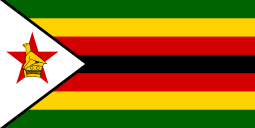 Zimbabwe (28 November 2006)
Zimbabwe (28 November 2006) -
 India (1 December 2006)
India (1 December 2006)
Since 2005, the ICC has granted temporary ODI and T20I status to six other teams (known as Associate/Affiliate members). Teams earn this temporary status for a period of four years based on their performance in the quadrennial ICC World Cricket League – or, more specifically, based on the top six finishing positions at the ICC World Cup Qualifier, which is the final event of the World Cricket League. On 28 June 2014, the ICC granted T20I status to Nepal and Netherlands, both of whom qualified for and took part in the 2014 ICC World Twenty20, but had both failed to gain/retain ODI status.[17] The following eight teams currently have this status (the dates listed in brackets are of their first T20I match after gaining temporary ODI or T20I status):
-
 Scotland (from 12 September 2007, until the 2019 World Twenty20 Qualifier)
Scotland (from 12 September 2007, until the 2019 World Twenty20 Qualifier) -
 Ireland (from 2 August 2008, until the 2019 World Twenty20 Qualifier)
Ireland (from 2 August 2008, until the 2019 World Twenty20 Qualifier) -
 Netherlands (from 2 August 2008, until the 2019 World Twenty20 Qualifier)
Netherlands (from 2 August 2008, until the 2019 World Twenty20 Qualifier) -
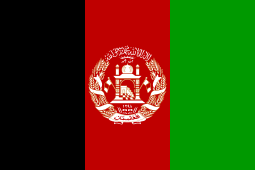 Afghanistan (from 1 February 2010, until the 2019 World Twenty20 Qualifier)
Afghanistan (from 1 February 2010, until the 2019 World Twenty20 Qualifier) -
 Hong Kong (from 16 March 2014, until the 2019 World Twenty20 Qualifier)
Hong Kong (from 16 March 2014, until the 2019 World Twenty20 Qualifier) -
 United Arab Emirates (from 17 March 2014, until the 2018 Cricket World Cup Qualifier)
United Arab Emirates (from 17 March 2014, until the 2018 Cricket World Cup Qualifier) -
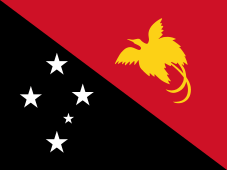 Papua New Guinea (from 13 July 2015, until the 2018 Cricket World Cup Qualifier)
Papua New Guinea (from 13 July 2015, until the 2018 Cricket World Cup Qualifier) -
 Oman (from 25 July 2015, until the 2019 World Twenty20 Qualifier)[18]
Oman (from 25 July 2015, until the 2019 World Twenty20 Qualifier)[18]
Four other Associate Nations have held temporary ODI and T20I status as a result of World Cricket League performances, before being relegated after underperforming at the World Cup or World Twenty20 Qualifier:
-
 Kenya (from 1 September 2007, until 30 January 2014)
Kenya (from 1 September 2007, until 30 January 2014) -
 Canada (from 2 August 2008, until 28 January 2014)
Canada (from 2 August 2008, until 28 January 2014) -
 Bermuda (from 3 August 2008, until 8 April 2009)
Bermuda (from 3 August 2008, until 8 April 2009) -
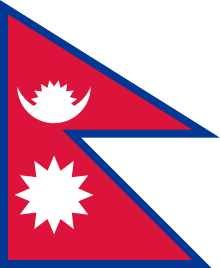 Nepal (from 24 November 2014, until 17 July 2015)
Nepal (from 24 November 2014, until 17 July 2015)
Cricket at international multi-sport events
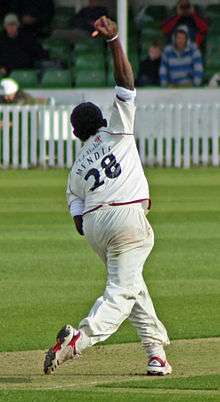
Cricket was played as part of the 1900 Summer Olympics, when England and France contested a two-day match.[19] In 1998, cricket was played as part of the Commonwealth Games, on this occasion in the 50-over format. There was some talk about Twenty20 cricket being part of the 2010 Commonwealth Games, which were held in Delhi, but at the time the Board of Control for Cricket in India (BCCI), were not in favour of the short format of the game, and it was not included.[20]
Cricket was played in 2010 Asian Games in Guangzhou, China[21] and 2014 Asian Games in Incheon, South Korea.[22] India skipped both times.[23] There was further calls for subsequent Commonwealth Games and Olympic Games. The Commonwealth Games Federation asked the ICC to participate in the 2014 and 2018 Commonwealth Games, but the ICC turned down the invitation.[24] In 2010, the International Olympic Committee recognised cricket as a sport which could apply to be included in the Olympic Games,[25] but in 2013 the ICC announced that it had no intentions to make such an application, primarily due to opposition from the BCCI. ESPNcricinfo suggested that the opposition might be based on the possible loss of income.[26] In April 2016, ICC chief executive David Richardson said that Twenty20 cricket can have a chance of getting in for the 2024 Summer Games, but there must be collective support shown by the ICC's membership base, in particular from BCCI, in order for there to be a chance of inclusion.[27]
Statistics
The highest team total in a T20I was made by Australia in September 2016, against Sri Lanka. Australia scored 263 runs for the loss of three wickets (263/3).[28][29] The lowest total also came in a match involving Sri Lanka: in 2014, the Netherlands were bowled out for just 39 runs against them.[30] The highest successful chase was made in early 2015, when the West Indies scored 236 runs to overhaul South Africa's target and win the match.[31]
Brendon McCullum has accrued the most runs in the format, and is the only batsman to have scored more than 2,000 runs.[32] He is one of less than twenty players to have scored a century in T20Is, and as of February 2015, the only one to have done so twice. The highest total in a T20I though, was scored by Aaron Finch, who totalled 156 runs in a match against England in 2013.[33] Three Pakistani bowlers lead the records for the most wickets; each having taken over 80 in T20Is: Saeed Ajmal, Umar Gul and Shahid Afridi.[34] Similarly, Sri Lanka's Ajantha Mendis has recorded the best two set of bowling figures in T20Is, and is the only bowler to have taken six wickets in a match, doing so against both Zimbabwe in 2012, and Australia in 2011.[35] Virat Kohli is the fastest cricketer to score 1000 runs in Twenty20 Internationals in 27 innings.[36][37]
See also
- Test cricket
- One Day International
- Twenty20 cricket
- Women's Twenty20 International
- ICC World Twenty20
References
- ↑ http://www.icc-cricket.com/team-rankings/t20i
- ↑ Birley, Derek (2003) [1999]. A Social History of English Cricket. Aurum Press. pp. 3–107. ISBN 1-85410-941-3.
- ↑ Williamson, Martin (9 April 2011). "The low-key birth of one-day cricket". ESPNcricinfo. Retrieved 3 February 2015.
- ↑ Williamson, Martin. "The birth of the one-day international". ESPNcricinfo. Retrieved 3 February 2015.
- ↑ "Cricket Max – The Game Invented By Martin Crowe". ESPNcricinfo. 2 February 1996. Retrieved 3 February 2015.
- ↑ "History of Twenty20 cricket". England and Wales Cricket Board. Retrieved 3 February 2015.
- ↑ "Meet the man who invented Twenty20 cricket – the man missing out on millions". Daily Mail. London. 11 June 2008. Retrieved 3 February 2015.
- ↑ Ramsay, Andrew (2006). "New Zealand v Australia". ESPNcricinfo. Retrieved 30 January 2015.
- ↑ English, Peter (18 February 2005). "Saved by Private Ricky". ESPNcricinfo. Retrieved 30 January 2015.
- ↑ "Records / 2005 / Twenty20 Internationals / Match results". ESPNcricinfo. Retrieved 30 January 2015.
- ↑ "WI beat NZ in historical tiebreaker". International Cricket Council. 26 December 2008. Retrieved 30 January 2015.
- 1 2 "Is twenty plenty?". ESPNcricinfo. 24 March 2007. Retrieved 30 January 2015.
- ↑ Premachandran, Dileep (26 September 2007). "Great win, but easy on the chest-thumping". The Guardian. London. Retrieved 3 February 2015.
- ↑ "Global Tournaments". International Cricket Council. Retrieved 3 February 2015.
- ↑ Gopalakrishna, HR; Vaghese, Mathew (11 September 2007). "Gayle and Gibbs run riot". ESPNcricinfo. Retrieved 3 February 2015.
- ↑ "(500) games of T20I cricket". cricket.com.au. Retrieved 18 February 2016.
- ↑ http://www.espncricinfo.com/ci-icc/content/story/756175.html
- ↑ "Oman secure World T20 spot with memorable win". ESPN Cricinfo. Retrieved 23 July 2015.
- ↑ Buchanan, Ian (1993). Mallon, Bill, ed. "Cricket at the 1900 Games" (PDF). Journal of Olympic History. International Society of Olympic Historians. 1 (2): 4.
- ↑ "Cricket unlikely at 2010 Games". ESPNcricinfo. 23 January 2006. Retrieved 3 February 2015.
- ↑ "Guangzhou Asian Games".
- ↑ "2014 Asian Games".
- ↑ "India to skip Asian Games again in 2014".
- ↑ "ICC rejects 2018 offer, cricket stays out of Commonwealth Games". Reuters. 24 July 2014. Retrieved 3 February 2015.
- ↑ "Cricket gets Olympic approval". ESPNcricinfo. 12 February 2010. Retrieved 3 February 2015.
- ↑ Qaiser Mohammad Ali (1 July 2013). "BCCI rejects plans to make cricket an Olympic sport due to 'conflict'". Daily Mail. London. Retrieved 3 February 2015.
- ↑ "ICC's chief executive David Richardson wants to expand World T20 first round to 18 teams, have Super 12 phase".
- ↑ "Records / Twenty20 Internationals / Team records / Highest innings totals". ESPNcricinfo. Retrieved 3 February 2015.
- ↑ "Records / Twenty20 Internationals / Team records / Largest margin of victory (by runs)". ESPNcricinfo. Retrieved 3 February 2015.
- ↑ "Records / Twenty20 Internationals / Team records / Lowest innings totals". ESPNcricinfo. Retrieved 3 February 2015.
- ↑ "Statistics / Statsguru / Twenty20 Internationals / Team records". ESPNcricinfo. Retrieved 3 February 2015.
- ↑ "Records / Twenty20 Internationals / Batting records / Most runs in career". ESPNcricinfo. Retrieved 3 February 2015.
- ↑ "Records / Twenty20 Internationals / Batting records / Most runs in an innings". ESPNcricinfo. Retrieved 3 February 2015.
- ↑ "Records / Twenty20 Internationals / Bowling records / Most wickets in career". ESPNcricinfo. Retrieved 3 February 2015.
- ↑ "Records / Twenty20 Internationals / Bowling records / Best figures in an innings". ESPNcricinfo. Retrieved 3 February 2015.
- ↑ "T20I 1000 runs club".
- ↑ "Records / Twenty20 Internationals / Batting records / Most runs in career".
